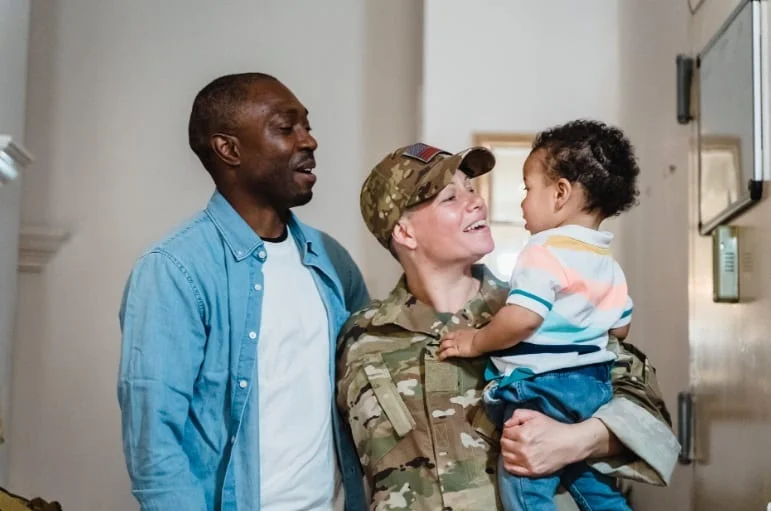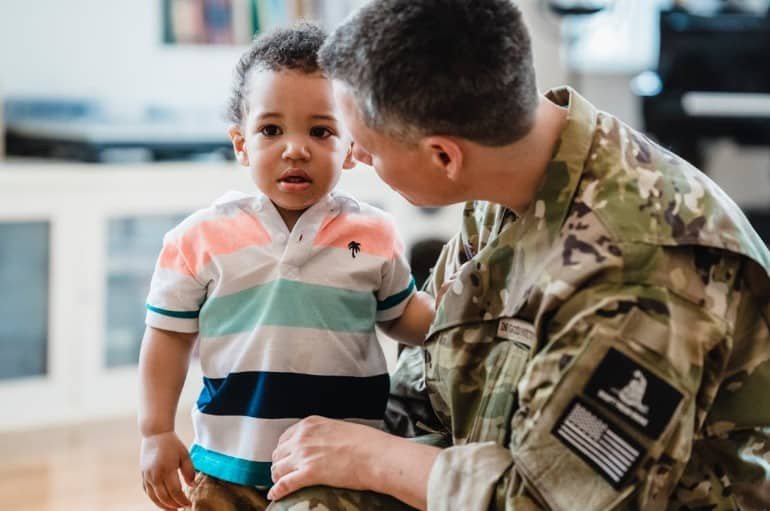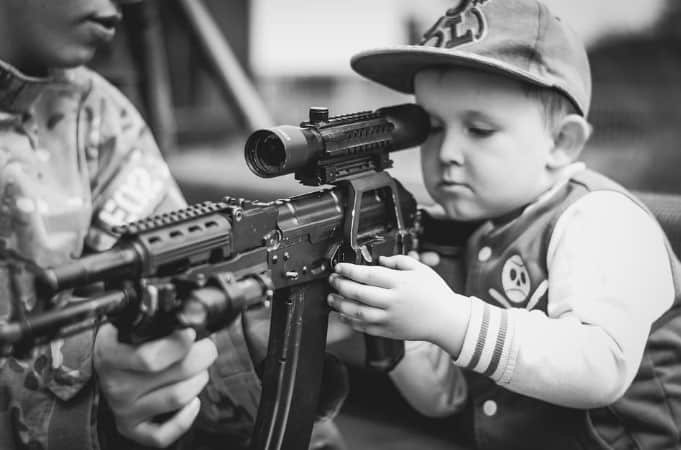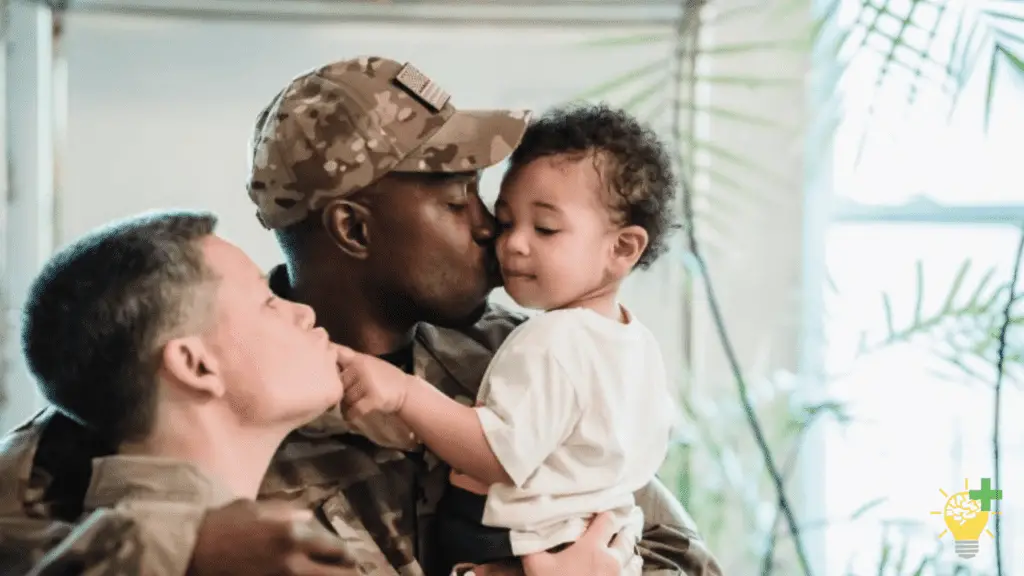Parenting, in general, is not the easiest of tasks, regardless of your children’s age, as each developmental phase comes with a variety of challenges.
Positive parenting can be quite challenging for many people because the parenting style involves consistently communicating, caring, leading, and meeting the needs of children unconditionally. This can be hard to practice for many civilian parents, let alone military parents.
Why is positive parenting for military families particularly hard?
Here’s why.
Military parents have to endure unique challenges while they raise kids. These challenges include working in hazardous and considerably stressful environments that ultimately affect their mental health, frequent and long separations during deployment, repeated relocations, and spouses sacrificing for their career opportunities.
Imagine being a military family working year after year in an organization that doesn’t necessarily encourage emotional literacy skills. It is only natural that many military parents will likely resort to force and fear as their parenting practices.
Raising kids this way can make them live in perpetual fear of being punished for mistakes rather than encouraging them to learn from mistakes. Also, a military parent in this type of environment may likely have a tough time processing their feelings – they will rather shy away from showing emotions, thanks to the rigid work environment.
However, military parents can also enjoy loving, respectful, and peaceful relationships with their kids and have a more positive family life.
Indeed, it will take a lot of practice because military parents will need to learn how to switch from the cold, unemotional work environment to a gentler, more compassionate, kinder, and empathetic yet firm parent at home.
Here are some tips that can make positive parenting for military families a tad easier.
Parents Should Be on the Same Page

Both spouses need to be on the same page for positive parenting to work more effectively in a military family. Children are not oblivious to parenting practices and styles and are quick to notice any differences in the parenting styles of both parents.
However, if parents work as teammates when it comes to establishing routines, kids will respect a more united decision. Also, it will make reintegration periods easier when the service family member returns from a deployment.
Military parents can be on the same page by:
- Regularly talking about family goals, wants, and needs together rather than making solo decisions. Even when the military member is away, discussions can still be held via regular phone calls and other communication channels.
- Military parents must communicate with each other respectfully, whether or not their kids are watching, and especially when the children are watching. Kids will quickly learn to respectfully communicate with peers and other adults when they see their parents interacting respectfully.
Never Fail to Remind Your Kids How Much You Love Them

Military life during active duty can be very time-consuming, and the chance of not letting those closest to us know how much we care about them are high. Remember to let your military child know how much they mean to you no matter how busy you get.
However, remember that it can be challenging for older kids to allow their parents to show them affection, especially in public or in front of their friends or peers. Still, parents must find a way to constantly remind their military kids that they love them.
Encourage Two-Way Communication

Following orders without question is the norm in the military. However, you must understand that things work a little differently in your home if you are a military parent.
Positive parenting involves practicing active listening and giving kids the freedom to ask questions, even if it seems as if they are questioning your authority.
If you want to raise kids who aren’t afraid to express themselves both verbally and emotionally, you should allow open communication.
Here are a few tips to improve communication:
- Ask kids questions about their day and give them undivided attention when they are talking. Avoid looking at your phone or giving in to other distractions when they want to have a conversation. Look them in the eye and provide appropriate responses.
- Pay attention to your kids’ body language to recognize when they don’t want to talk. Respect their decision if they are not open to having a conversation, but be there when they are ready.
- Get on your child’s level if you want the conversation to flow freely. For example, join them in one of their favorite games (remember to lose many times if it is a competitive game!).
- Encourage your child to ask questions about their concerns and talk honestly about them. Don’t be afraid to talk about your feelings, fears, and hopes. This will encourage your child to be forthcoming with feelings rather than bottling things up.
- Kids can ask the most difficult questions, so be prepared to talk about some uncomfortable topics.
Give Yourself a Break

It is okay to ask for help if you are solo parenting. Parenting is not easy, even when both spouses are together, let alone when the service member is away.
It is normal if you feel burned out sometimes. Here are a few helpful tips to help you get through frustrating moments:
- Forgive yourself for mistakes: No matter how hard you try to implement positive parenting, things can get out of hand sometimes. Don’t beat yourself up because you failed to stick to the textbook definition of positive parenting. After all, no one is perfect. You lost your cool and yelled at the kids? It’s okay. You are human, so don’t punish yourself unnecessarily or hold yourself to some unreasonable standards.
- Accept compliments: One of the clearest signs of a healthy sense of self-esteem is being able to accept compliments. Accept compliments when people tell you nice things about your parenting because you deserve it. But don’t look for compliments or even expect them from other parents. And whatever you do, don’t put yourself down if other parents judge your parenting.
- Get a babysitter: Whether you pay someone to babysit your kids or ask a friend to keep an eye on your kids for a short time, it is important to take time off from parenting duties once in a while. Take a break to recharge so you can come back fully rejuvenated to give your kids the best version of yourself.
Encourage Kids to Explore Hobbies and Interests

Create opportunities for your kids to get creative with extracurricular activities, hobbies, and interests.
This is particularly important when the family relocates to a new base. You want to give them the chance to quickly adapt to the new environment by allowing them to explore what makes them feel more at home.
Let your children sign up for language lessons, try new dishes (if they are old enough), or try new ways of doing things if you’ve moved to a new country.
While you’re at it, I recommend teaching kids these powerful affirmations to help boost their self-confidence in their new environment.
But you don’t have to wait until you move to a new location to encourage hobbies and interests. Let your kids get creative whether or not they are in a new country.
Final Thoughts
Positive parenting for military families might be extra challenging, but it is doable. These few tips can make all the difference between raising timid or depressed children and forward-thinking children.
While you’re here, I invite you to check out other parenting tips to help you raise the ideal family of your dreams.




